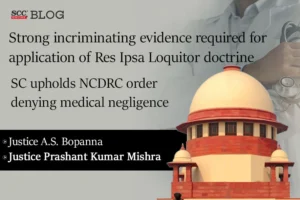Supreme Court: In an appeal against the order passed by the National Consumer Disputes Redressal Commission (‘NCDRC’) dated 03-08-2010 whereby the complaint filed by the appellant under Section 2(c)(iii) of the Consumer Protection Act, 1986 was rejected, the division bench of A.S. Bopanna and Prashant Kumar Mishra*, JJ. while upholding the findings of NCDRC, viewed that the appellant has failed to establish negligence on the part of respondents in taking post operative care. Further, it held that for applying the principles of Res Ipsa Loquitor, it is necessary that a ‘Res’ is present to establish the allegation of negligence. Strong incriminating circumstantial or documentary evidence is required for application of the doctrine.
Background:
The complainant/ appellant is the wife of the deceased patient who was 37 years old and died on 06-11-1998 in the Indraprastha Apollo Hospital while undergoing follow up care and treatment after a major neurosurgery in the care of respondents.
After performing pre-operative medical examinations, respondent no. 2 conducted the operation of the deceased. The deceased was thereafter shifted to a private room, thereafter the doctors visiting the deceased were informed about pain in the neck region, which seemed to have transferred lower where pain used to occur prior to operation. At about 06.30 p.m. the deceased was given pain reliever intravenously, but the pain increased along with severe sweat spells. Thereafter, he started suffering from severe unbearable pain. The appellant called respondent no. 2 at his residential phone, but he was not available. Another pain killer was intravenously given. Thereafter, the deceased suffered a heart attack, and was declared brain dead on 31-10-1998. The grievance of appellant is that the deceased was not attended to by any doctor from neurosurgery team who had operated him after he was shifted into the private room till 11.00 P.M. After such major surgery, instead of shifting to a private room, the deceased should have been shifted to the Intensive Care Unit.
NCDRC said that the appellant has not been able to establish by any cogent evidence or material on record that the heart attack suffered by the deceased had any connection with the operation in question or on account of lack of post-operative care. No case of medical negligence has been proved nor can it be said that the aftercare treatment of the deceased till he suffered a cardiac arrest was inadequate so as to hold the respondents liable for medical negligence.
Issue: Whether the respondents have committed negligence in not providing proper post-operative medical care to the patient and, accordingly, whether the Commission has committed any illegality while dismissing the complaint filed by the appellant.
Analysis:
The Court noted that the entire case of the complainant was about lack of proper post-operative medical care. After perusing the material available on the record, it said that per the standard practice, all patients who show no signs of complications in the recovery room and have no post or pre-operative complications are sent to their rooms. Further, during the months of September to November 1998, out of 166 neurosurgeries, only 68 patients were sent to the ICU from the recovery room in the hospital. The rest were sent back to their wards in accordance with standard procedure. The symptoms, which emerged after the deceased was discharged from the Operation Theatre, were not the symptoms which typically precede a cardiac arrest. Since the deceased did not have any known or identifiable heart ailments, it was impossible for the respondents to have prior knowledge that the patient may develop cardiac problems after a few hours of successful surgery. The symptoms, including dizziness, sweating, and pain in the neck area, experienced by the deceased post-surgery, could not be treated as post-surgery reactions. Therefore, in the absence of complications in the surgery or soon thereafter, the patient was not required to be shifted to ICU and there is no negligence on this count by either of the respondents.
In so far as the applicability of principles of Res Ipsa Locutor, in the fact and circumstances of the case, the Court said that the principles get attracted where circumstances strongly suggest partaking in negligent behavior by the person against whom an accusation of negligence is made. For applying the principles of Res Ipsa Locutor, it is necessary that a ‘Res’ is present to establish the allegation of negligence. Strong incriminating circumstantial or documentary evidence is required for application of the doctrine.
The Bench noted that patient did not have any history of diabetes or hypertension or any cardiac problem. Therefore, it was difficult for treating doctors including the duty doctor or the hospital to assume that the patient may suffer cardiac arrest. Moreover, the patient did not complain of pain in any other part of the body except the neck region. There is no evidence put forth by the complainant to establish that the heart attack suffered by the patient had any connection with the operation in question or that it was on account of negligent post operative care.
The Court said that there was no mistake in diagnosis or a negligent diagnosis by respondent no. 2. In the absence of the patient having any history of diabetes, hypertension, or cardiac problem, it is difficult to foresee a possible cardiac problem only because the patient had suffered pain in the neck region.
Thus, the Bench upheld the impugned order.
[Kalyani Rajan v Indraprastha Apollo Hospital, 2023 SCC OnLine SC 1355, decided on 17-10-2023]
*Judgment Authored by: Justice Prashant Kumar Mishra
Know Thy Judge | Supreme Court of India: Justice Prashant Kumar Mishra

